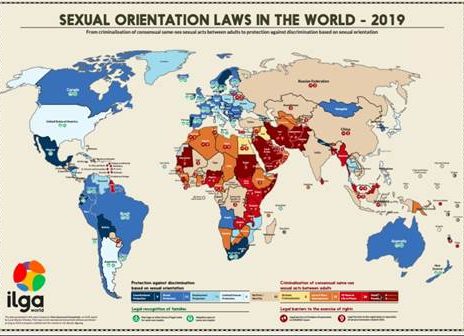Helpful resources
Study abroad LGBTQIA+ guide GlobalGayz, a travel and culture website for LGBTQIA+ travelers The Advocate, an LGBTQIA+ focused news source National Center for Transgender Equality The International Lesbian, Gay, Bisexual, Trans, and Intersex Association NAU Office of Inclusion: Multicultural & LGBTQIA Student ServicesLGBTQIA+ students study abroad
NAU supports student diversity
Congratulations on taking the first steps to go abroad! As a student who identifies as LGBTQIA+, there are some additional considerations and issues you may want to research before and during your time abroad. Some important questions to ask yourself:
- How open will I be about my sexual orientation and gender identity with teachers/peers/friends/host families/others?
- How important is it to me to find other LGBTQIA+ students and friends while abroad?
- What are my safety needs and how can they best be met?
You will also want to do a bit of research into the norms and expectations of your host country:
- What are the cultural attitudes toward sexual orientation and gender identity in my host country?
- What are considered typical male and female social behaviors and customary gender relations and social patterns in my host country?
- What is the attitude of local residents toward people from the U.S.? People from other nationalities? Tourists? LGBTQIA+ tourists?
- What is the general police attitude toward those groups?
- Will I need access to any medications, supplies or services while abroad? Will it be available? If not available, what is the process to bring it in country?
- Can my program make accommodations for me? (Ensuring a private bathroom, matching with LGBTQIA+ friendly roommates, etc)
- What resources are available on campus to members of the LGBTQIA+ community?
- Are there any LGBTQ+ friendly establishments nearby?
Keep in mind that once you leave the U.S., you are no longer protected by U.S. laws. Some countries around the world have criminalized same-sex relations and consensual sexual activity between same-sex people, and some countries have made it illegal to be transgender. If you engage in same-sex sexual activity in a country in which it is outlawed, you risk being arrested and imprisoned in that country.
It is important to reflect on the culturally based ideas and definitions of sexual identity and consider carefully how your identity as a LGBTQIA person may affect your relationships with host country nationals, your cultural adjustment, and your overall study abroad experience. Regardless of where you go, it is important to be alert and try to avoid potentially unsafe environments.
If you experience difficulties, contact the U.S. Embassy or Consulate in your host country. They are available 24/7 to assist U.S. citizens while they are abroad.
Money matters
Finances for study abroad are a consideration for nearly all students regardless of race/ethnicity/sexuality/gender identity. NAU and other organizations offer special scholarships for study abroad, financial aid (grants, loans) can be applied to almost all programs, and merit-based NAU scholarships (Lumberjack, Blue, Gold, Transfer) can be applied to exchange programs. Some rules and restrictions apply based on the type of scholarship and program, and your Education Abroad advisor can help explain what scholarships are best for you to apply for. Learn more on the scholarships webpage.
Many scholarships focus on diversity and sending underrepresented students abroad, such as the Fund for Education Abroad, the Gilman Scholarship, and Diversity Abroad. Students are encouraged to attend our scholarship workshops and apply for any scholarships they qualify for.
